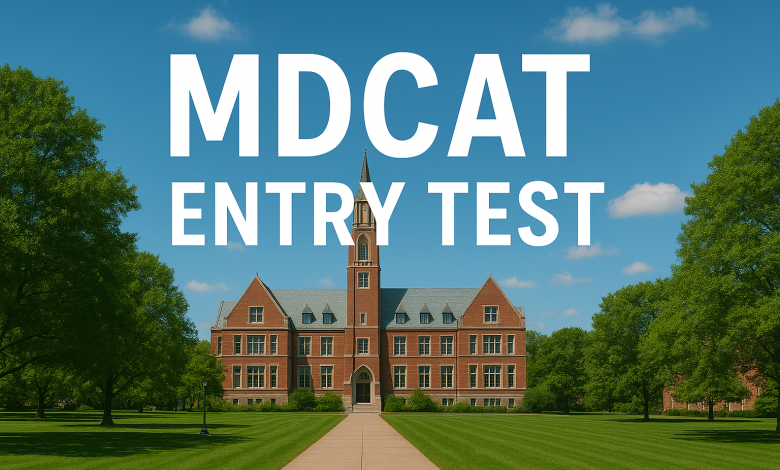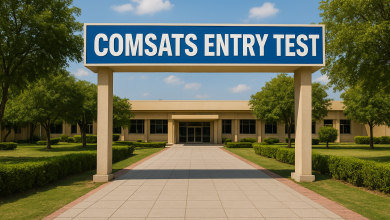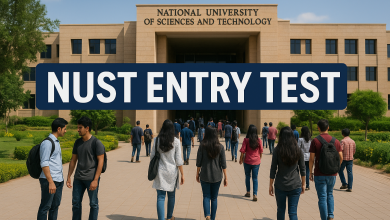Creating the Backdrop for MDCAT Entry Test 2025-26: An Opening Act

The calling of medicine takes root at a wide-open threshold, where wave after wave of students arrive each year, driven by the promise of white coats, stethoscopes, and a lifetime of care. That symbolic doorway is remembered by a name familiar to all: MDCAT (Medical & Dental Colleges Admission Test). In 2025-2026, it rises above the page and becomes a trial of spirit; gathered from the ashes of sleepless nights, written in sacrifice, and a fire of hope glowing hot beneath the skin. For every student who has eyes set on tomorrow, and for those who pray beside them, MDCAT 2025-26 is the moment of reckoning.
In this guide, we’ll cover the whole battlefield – from registration to result, from planning to pushing through. The first whistle blows now.
MDCAT, Explained and Why is it Your Boarding Pass to White Coats and 36-Hour Shifts (2025-26)
“MDCAT” translates as Medical & Dental Colleges Admission Test. In essence, MDCAT is Pakistan’s checkpoint into medicine, the exam that channels students toward MBBS and BDS programs across public and private medical and dental colleges.
- Its purpose is to evaluate knowledge in Biology, Chemistry, Physics, English, and Logical Reasoning (sometimes critical thinking too), within set time limits.
- The exam has changed across the years: it was run more provincially; it is now under PMDC’s regulation with firm eligibility conditions and uniform policies.
- Your MDCAT result functions as the backbone of your merit combined with FSc or equivalent and provincial policies, it decides entry into public medical or dental colleges.
With stakes this high, thousands will battle, study, and sweat over MDCAT 2025-26. Let’s decode it, bit by bit.

The Remix of Rules and the Changing Script of MDCAT 2025-26
To keep your footing, you’ve got to know how 2025 redraws the lines. Some changes are locked in, others are still gossip. Here’s what stands confirmed as of now:
| Change | Description |
| Raised Eligibility Bar | Minimum FSc (Pre-Medical) requirement raised from 60% to 65% |
| Domicile-based Testing Enforcement | Students can appear only in their own province/region of domicile |
| Date Rescheduled | Initially set for October 5, 2025; postponed to October 26, 2025 due to floods |
| Registration Fee Increase | From ~PKR 8,000 to PKR 9,000 (for domestic candidates) |
| No Negative Marking | As before, wrong answers do not carry penalty |
| Test Structure Revised | 180 MCQs, 3 hours duration (uniform across provinces) |
Quick caveat: Numbers may shift depending on the source, 200 MCQs, 3½ hours, and more. Trust only the official PMDC/provincial announcements.
This year, the spotlight falls on fairness, transparency, and giving everyone a fair shot – with flood-affected students front of mind. Moving the test to October 26 embodies that commitment.
The March of Hours to MDCAT 2025-26: Timeline & Key Dates
Dates might shuffle, but here’s the working timeline: mixing confirmed and probable ones.
| Phase | Date / Window |
| Registration Opens | August 8, 2025 (tentative) |
| Regular Registration Deadline | August 25, 2025 |
| Late Registration Deadline | September 1, 2025 |
| Original Exam Date Announced | October 5, 2025 |
| Revised Exam Date | October 26, 2025 |
| NUMS MDCAT Date (for military colleges) | September 14, 2025 |
| Admit Card Issuance | Likely 1–2 weeks before exam |
| Result Announcement | Usually within 2–3 weeks after exam |
Remember: Nature sometimes rewrites the script – PMDC might delay, adjust protocols, or reshuffle centers Follow only official PMDC/university updates.
Register. Apply Like a Pro and Submit
First things first: registration must be handled with care. A single mistake could block your entry. Here’s the safe route:
- Register an account at PMDC’s official portal or provincial student portal. Use an email and phone number that work.
- Fill out your profile: enter your legal name, CNIC/B-form, father’s name, address, and domicile.
- Pick your exam centers: usually two, arranged by preference.
- Pay your dues: using a challan, online banking, or another official method. For 2025, the local fee is around PKR 9,000; late fees are higher.
- Gather your documents: passport-size photo (blue or white background), CNIC/B-form, SSC/FSc certificates (or equivalent), domicile.
- Check everything twice: confirm spellings, check document clarity, and center selection.
- Submit the completed form ahead of the deadline.
- Collect your admit card (roll slip) once it’s issued, check name/center/date/time.
Backup buddy: Keep soft and hard copies of your documents.Take screenshots at every stage.
NUMS does things its own way as their MDCAT flows through a separate portal.
Exam Anatomy, Weight Distribution, and Test Layout
Don’t walk in blind – peek under the hood before the ride. Here’s the current exam design (with possible revisions):
| Component | Details |
| Total MCQs | 180 |
| Duration | 3 hours (no extra time) |
| Marking Scheme | +1 for each correct answer; no negative marking (wrong = 0) |
| Pass Criteria | 55% for MBBS admission; 50% for BDS (in many jurisdictions) |
| Subject Weightage | • Biology — major share (~34% or more) • Chemistry — moderate share • Physics — moderate share • English — minor share • Logical Reasoning / Critical Thinking — small portion |
| Difficulty Levels | • ~70–80%: Standard FSc syllabus • ~15–20%: Higher difficulty / critical thinking & application • ~5–10%: Intuitive reasoning / interpretation |
| Exam Mode | Paper-based MCQs (no computerized format yet) |
| NUMS MDCAT Variant | Paper I: 150 MCQs, ~2h45min Paper II: Psychological/Aptitude, ~50 MCQs, 15 minutes |
Gone are the days of rote, so forget parroting – that’s the exam’s promise this year.
Recipe for Success: What Syllabus is Being Served?
The exam is a war of wits, and the syllabus is the ground plan. The MDCAT 2025 syllabus (uniform curriculum) lays out:
- Biology: Cell biology, genetics & evolution, physiology (plant & animal), ecology, reproduction, etc.
- Chemistry: Physical chemistry, organic chemistry, inorganic chemistry, electrochemistry, etc.
- Physics: Mechanics, electricity & magnetism, thermodynamics, waves, optics, etc.
- English: Grammar, vocabulary, comprehension, sentence completion, etc.
- Logical Reasoning / Critical Thinking: Analogy, patterns, syllogism, puzzles, verbal reasoning, etc
As per the official outline, MDCAT goes beyond concepts and tests the art of thinking critically and intuitively.
To view the entire syllabus, consult the official Uniform Curriculum MDCAT 2025 PDF published by KMU and others.
Exam Hack: The exam won’t reward parrots so stop babysitting easy MCQs, as you need the heavy lifting of tricky edges and reasoning before test day.
In Summary
The story of MDCAT 2025-26 unfolds like an epic – discipline keeps it alive, strategy its direction, and growth as its triumph. In this guide, we’ve placed the core essentials: the meaning of MDCAT, the changes approaching, the structure of exam and syllabus, and the most effective preparation practices. When MDCAT feels like a mountain and nerves cloud your focus, foriEDU answers with disciplined prep, real drill practice, and with tutors who’ve wrestled with MDCAT themselves and know how to push back.
This chase isn’t for marks alone – it’s the pull of a stethoscope, the silence of a ward, and the trust written in a patient’s face. The white coat is calling.
FAQs
- What subjects will be tested & what’s the weightage?
Biology, Chemistry, Physics, English, Logical Reasoning (with emphasis on reasoning & application). The weightage will be confirmed only after the official stamp of approval is given.
- If I don’t clear MDCAT or get a seat, what can I do?
Options remain on the table: a possible retake (where allowed), try for private institutions, or look to foreign admissions. A few provinces even allow waiting or vacant seat rounds.
- When will the results be announced?
Results typically land in 2-3 weeks, though province-specific timelines or delays push it further.
- Is there negative marking?
The good news: MDCAT doesn’t cut marks as zero negative marking exists.
- What is the new eligibility criterion?
Candidates must have secured 65% in FSc Pre-Medical (or equivalent).



